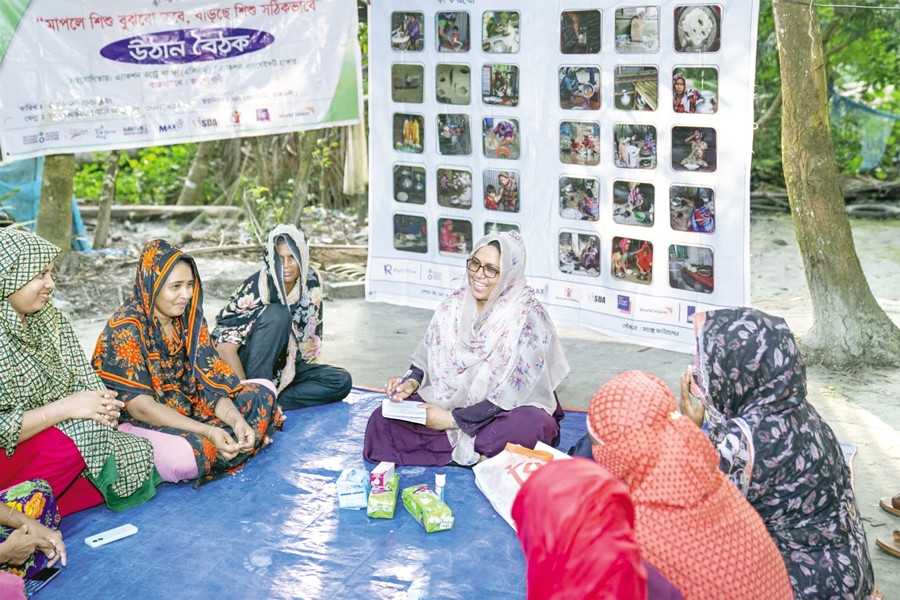
Published :
Updated :

As Bangladesh's economy continues to grow, certain public health challenges persist -- particularly in child health, nutrition, maternal health, and adolescent well-being. To ensure lasting and sustainable progress in these sectors, donor-dependent interventions alone are no longer sufficient; innovative, market-driven, and long-term solutions are now essential. With this vision, Max Foundation has emerged as a change-maker, establishing innovative market-led approaches to health and nutrition through a market-oriented, data-driven, and community-centred approach.
Max Foundation believes that development is not merely about aid -- it can also create sustainable livelihoods and promote entrepreneurship. Guided by this principle, the organisation has introduced an entrepreneurship-based development model in health and nutrition services, engaging local micro-entrepreneurs in service delivery. This approach simultaneously achieves two vital objectives: ensuring access to essential health and nutrition services for rural communities and strengthening the local economy by generating income opportunities.
Despite commendable progress in recent decades, Bangladesh's child and maternal health indicators remain concerning. According to UNICEF, around 10 million children in the country suffer from "child food poverty" -- they consume food from fewer than five essential food groups daily. The 2022 Household Income and Expenditure Survey (HIES) shows that 24 per cent of children are stunted (low height-for-age) and 11 per cent are wasted (low weight-for-height). Malnutrition among mothers and adolescent girls also remains alarmingly high. Each year, more than 600,000 babies are born underweight due to inadequate access to nutritious food and care. These figures clearly demonstrate that the issue extends beyond healthcare -- it is a structural crisis.
Addressing this crisis requires integrating food security, women's empowerment, healthcare, and local economic growth through market-led approaches. Max Foundation has responded by transforming health and nutrition into a market-driven social opportunity. Its core strategies include:
Building a local entrepreneurship model
To address issues such as unsafe water and limited healthcare access, Max Foundation engages local entrepreneurs in awareness and service delivery. They are trained and supported to meet community demand for nutrition and WASH (Water, Sanitation and Hygiene) products and services. This not only ensures social impact but also creates income opportunities -- particularly for women. Empowered through training, these women entrepreneurs now play a pivotal role in improving access to nutrition and WASH services at the community level, contributing to lasting, self-sustaining change.
Ensuring safe water access
In coastal regions where safe drinking water is scarce, the organisation has already established around 100 community water grids, benefiting approximately 5,000 families. To sustain these initiatives, Max Social Enterprise was formed to locally manage and expand the grid systems, ensuring long-term functionality and community ownership.
Data-driven planning
Every Max Foundation initiative begins with field-based research and data analysis. By identifying areas with high child mortality, acute nutrition gaps, and vulnerable adolescent populations, the organisation designs context-specific interventions. This data-driven approach ensures that projects are both realistic and measurable in their outcomes.
Financial and policy coordination
To sustain local entrepreneurship, Max Foundation has created linkages with banks, microfinance institutions, and government agencies. As a result, women entrepreneurs can access loans under favourable terms while markets for health-related products are expanding, and community awareness is growing.
At the heart of Max Foundation's work in Bangladesh are children and women -- especially those under five years of age and adolescent girls. Recognising the central role of women in family health and nutrition, the organisation trains rural women as health product sellers, local entrepreneurs, and community advocates. These women are now leading grassroots health awareness movements. Some have become self-reliant entrepreneurs, while others have emerged as symbols of inspiration within their communities.
The success of this model is evident in rural areas where cases of diarrhoea and malnutrition have declined, awareness of newborn care has increased, and access to safe water and sanitation has improved. Most importantly, these achievements are not dependent on external aid -- communities themselves are taking charge of their problems, using their own capabilities to shape a healthier future.

Dr Tariqul Islam, Country Director of Max Foundation, explained:
"Max Foundation has developed an innovative business model for improving child and maternal health. The key to our success lies in our partnership-based approach. We work collaboratively with local NGOs, government agencies, and international development partners. Such integrated models make our initiatives not only effective but also sustainable in the long term.
Our primary goal is to create an environment that eliminates malnutrition among children under five, enabling them to begin life in good health. Alongside policy advocacy, we focus on building the capacity and awareness of local governments, target communities, and entrepreneurs. As healthy habits take root, the demand for nutrition and WASH products and services increases. To meet this growing demand, local entrepreneurs -- alongside public institutions -- play a crucial role in supplying and distributing essential products.
"When government departments, local businesses, and market-based actors work together, access to health, water, and nutrition services becomes much easier for beneficiaries. As a result, these initiatives continue sustainably even after the end of project funding."


 For all latest news, follow The Financial Express Google News channel.
For all latest news, follow The Financial Express Google News channel.